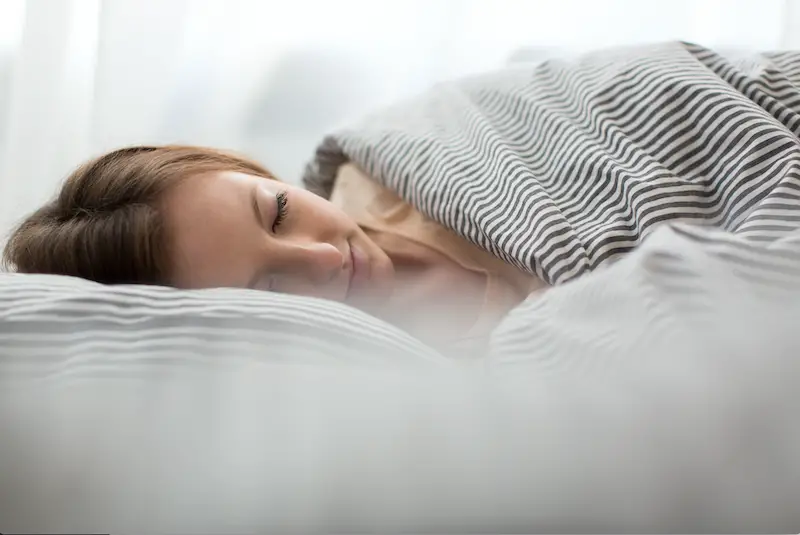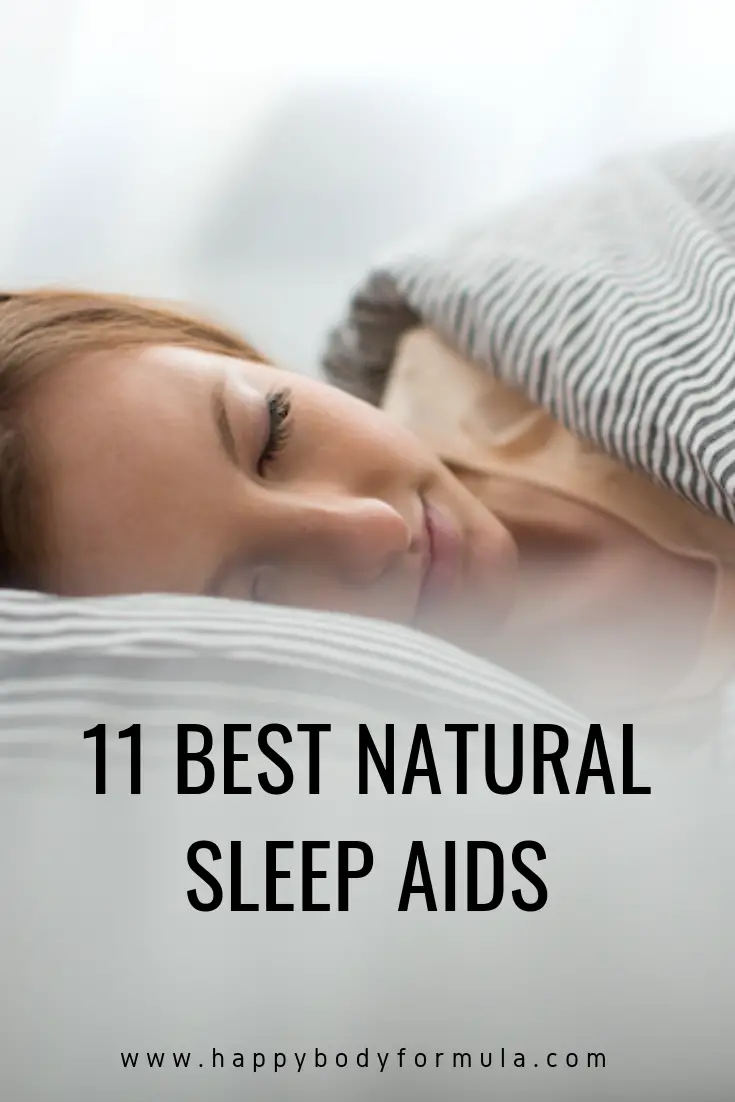
Without quality sleep and rest, we cannot be healthy people. Sleep is when our bodies regenerate, repair, and generally work to keep us fully functioning. If we run low on sleep a few nights here or there, we might be tired, but we can bounce back pretty quickly.
But if sleep issues become a perpetual problem, as they are for one-third of all adults, then we can slowly become ill, with hormone imbalances, trouble losing weight, poor immunity, and more.
Sleep is the vital medicine that we need, but if sleep is problematic, some feel as if they have no alternative but prescription sleep aids. However, these can come with a hefty dose of side effects as well as the risk of dependency.
Instead of turning to pharmaceuticals, consider trying one of these proven natural sleep aids, which can help to correct sleep imbalances and insomnia without vicious side effects or dependency.
[toc]
The 11 Best Natural Sleep Remedies on the Market
The following remedies can all help to improve sleep. If you’re having trouble getting a full night’s rest, explore the natural alternatives in this list.
Note: Never take herbs or supplements without first checking with your doctor. Natural sleep aids and other supplements can have drug interactions.
Magnesium
Magnesium is an essential mineral in the body that is required for hundreds of different processes ranging from muscular function (including the heart, which is a muscle) to neurological function to mood, and yes, even sleep.
Magnesium functions as a relaxer and can help to calm the mind and body when it comes time for sleep.
One of the reasons why magnesium benefits the sleep cycle is that it stimulates the natural production of melatonin, the body’s hormone that helps to regulate the circadian rhythm or the wake-sleep cycle.
Having low levels of magnesium, even if isn’t a true deficiency, can be associated with poor sleep and even insomnia.
Research shows that taking 500 milligrams of magnesium before bed for eight weeks can improve sleep quality and balance the hormones that regulate the sleep cycle, meaning: the body doesn’t get dependent on needing magnesium to sleep. Instead, magnesium helps the body to correct its own imbalances.
How to get magnesium: Supplement form (between 150 and 500 milligrams before bed) or topical magnesium oil, and also found in dark chocolate, spinach, pumpkin seeds, goat’s milk kefir, and almonds
Glycine
Glycine is an amino acid that is essential for several body systems, especially the nervous system. Because the brain plays a key role in being able to settle into a healthy sleep cycle, proper levels of glycine can help to improve sleep quality and quantity.
The brain, along with sleep hormones, helps to prepare the body for sleep by lowering temperature, which helps the body settle into slumber.
Studies show that 3 grams of glycine before bed can result in better sleep, higher energy levels the next day, and improve cognition. Glycine was also able to speed the time it took to fall asleep.
How to get glycine: Glycine supplements come in capsule or powder form (1 to 5 grams daily), and also found in bone broth, all meats, eggs, poultry, seafood, cabbage, kale, spinach, beans, kiwi, and banana
Passion Flower
One of the more popular herbal remedies, passion flower can help to improve sleep and address insomnia. Passion flower tea is the most effective way to get sleep benefits from this herb, which also boasts mentally calming and anxiety fighting effects.
Passion flower can quiet the mind and prepare the brain for restful sleep.
Not only can it improve sleep quality and address anxiety, it can also work to decrease inflammation, menopausal symptoms like hot flashes, pain from chronic conditions, and muscle spasms.
Passion flower can be beneficial, but it shouldn’t be taken consistently for more than two months at a time. It works best when used on an as-needed basis.
How to get passion flower: Take as an herbal supplement or brew as an herbal tea
Melatonin
Melatonin is produced in the body to regulate the sleep cycle. It is a hormone, but can also be found in supplement form.
Melatonin helps tell the brain when it’s time to go to sleep. The levels are supposed to be low in the morning and rise throughout the day, culminating at bedtime to tell you it’s time for sleep.
But because of many factors, like stress, insomnia, jet lag, or other hormone stressors, the body’s melatonin levels can become off balanced and can result in higher levels in the morning and lower levels in the evening. This combination can result in daytime tiredness and nighttime insomnia.
Melatonin in supplement form can lead to increased number of sleep hours, and can shorten the time it takes to fall asleep. Research shows that 1 to 5 milligrams of melatonin can provide optimal sleep benefits.
Melatonin can be beneficial for awhile, but is not meant to be used as a long-term sleep aid.
Not only does melatonin help to boost the body’s ability to rest and sleep, it can also build the immune system and decrease inflammation.
How to get melatonin: Take it in supplement form, following dosage instructions
Chamomile
Chamomile is a soothing herbal tea that is popular for its ability to produce a calming response. But it can also help to promote healthy sleep and a balanced mood, including working to combat depression and anxiety.
Chamomile is most often used in tea form, although some herbal supplements may be used, too. If you want to use chamomile tea for sleep, brew a cup using dried chamomile flowers or prepared tea bags. Drinking it within an hour of your desired bed time.
While chamomile is safe for longer term use, if you’re allergic to daisies or other flowers, be sure to consult with your doctor before trying chamomile in case of a cross-reaction.
Chamomile can promote restful sleep and relaxation, but it can also help to boost digestive function, address tense muscles, and work to relieve tension headaches.
How to get chamomile: Brew chamomile tea or take in supplement form (less common)
Calcium
The old habit of drinking a warm glass of milk before bed to promote sleep might not be too crazy: calcium, a mineral found in milk, can help to promote a balanced sleep cycle.
When calcium levels are low or deficient, it can prevent the body from going through an entire sleep cycle, since it is needed for REM (rapid eye movement) sleep. This could result in sleep that isn’t restful and chronic feelings of tiredness.
The brain uses calcium to make melatonin, so when calcium levels are low, natural levels of melatonin will also be suppressed.
Calcium isn’t only found in milk, however. It is also found in sardines, dark leafy greens, and other foods.
You don’t have to take it every day to correct an imbalance and make sure that you work with a practitioner if you choose to supplement, because supplementing some minerals can result in imbalances with others if the dosage is incorrect.
How to get calcium: Milk, chia seeds, almonds, rhubarb, dark leafy greens, sardines, and calcium supplements
Valerian Root
Valerian root is an herb that is commonly found in natural sleep aids, but it’s also relied on to address anxiety and the unpleasant symptoms of menopause, like hot flashes and mood disturbances.
Valerian root supplements help to promote improved sleep quality once you’ve gone to sleep, and some even find that it helps them fall asleep too, as it seems to have mild sedative properties.
It is often combined in tea form with chamomile, but it can also be found in supplements alone or with other herbs, such as hops, lemon balm, and passion flower.
Valerian is an herb to start slowly with and work up to the recommended dosage since it can have a strong sedative effect on people who aren’t used to taking it, and could contribute to next day grogginess.
Valerian root works over time to improve sleep, so should be taken regularly for at least two to six weeks, gradually increasing the dose. When you’re done with valerian root, wean off it in the same manner, especially if you are prone to anxiety, to reduce the chance of developing sudden symptoms.
Valerian root is also used for things like depression and headaches, as well as other mood-boosting benefits. It can also help to address period cramping and some other types of muscle and joint pains.
How to get valerian root: Take in herbal supplement form or drink as a tea
Hops
Hops are often associated with beer, but they aren’t brewed themselves, rather, are used to flavor beer. They’re also an herb that has medicinal properties, including sleep improvement.
Not only can hops improve sleep quality, but it can also help to calm an irritated mind and improve digestion. However, hopes might not be for everyone, as they can worsen depression in certain people, in the same way, that St. John’s wort can.
If you deal with depression or take medication for depression or anxiety, do not take hops.
How to get hops: Drink a non-alcoholic beer that contains hops or take as an herbal capsule or powdered supplement
Lavender
A familiar scent associated with relaxation, lavender is one of the most studied of all essential oils. While it is a flower that can be eaten or used in other ways, including brewed as tea, most uses for lavender come from the essential oil.
Just the fragrance of lavender alone can improve sleep quality, especially when it is smelled within 30 minutes before going to sleep. Some research even shows the scent of lavender to be as effective as oral sleep aids.
To reap the greatest benefits, you can diffuse lavender next to your bed for the entire night of sleep, or make a pillow spray that you add to your pillow every night before bed.
In addition to promoting healthy sleep, lavender can also improve mood and bring a calming stability to anxiety and depression. Bonus: lavender has no reported negative side effects.
It can also work to eliminate headaches and respiratory discomfort, as well as soothing upset stomach and relieving pain—just from the scent.
How to get lavender: Diffuse or sniff as an essential oil, use topically as an essential oil, or brew lavender tea from dried lavender flowers
5-HTP
5-HTP is an amino acid which is associated with tryptophan, the amino acid most commonly associated with turkey and that sleepy post-Thanksgiving dinner desire to sleep.
5-HTP specifically can help to boost certain neurotransmitter levels, which can help to improve sleep quality and length in certain individuals.
5-HTP can also be used to address depression and anxiety as well as tension headaches. It should never be taken unless your practitioner directs you, since it can influence how neurotransmitters work in the brain and can interact with certain medications.
It should never be used for more than four to six weeks.
How to get 5-HTP: Supplement form only
Ginseng
Ginseng is an herb often used to boost immunity and sometimes even to aid in weight loss. But ginseng can also help to promote healthy sleep. In as little as a week, ginseng supplements can help to improve quality of sleep, boost energy levels, and decrease stress levels.
Ginseng should only be taken for two to three months at a time before taking a break.
How to get ginseng: In supplement form
Who Shouldn’t Use Natural Sleep Aids?
While it’s tempting to rely on sleep aids if you’re having trouble getting the rest that you need, certain people shouldn’t rely on sleep aids, even if they are natural.
Don’t use any of these or other natural sleep aids if you are:
- Pregnant or could be pregnant
- Breastfeeding
- Already taking sedatives or sleeping prescriptions
- Taking antidepressants or anti-anxiety medication
- Taking any prescription drugs
- Will be having surgery within the next few months
While these natural sleep aids are generally considered safe, they can interact with other medications and even other supplements, which is why it’s vital to run all supplements by your practitioner.
Never give sleep aids to a child under age 18 unless directed by a doctor.
Share on Pinterest

Resources
- Choi JJ, Oh E-H, Lee MK, Chung YB, Hong JT, Oh K-W. Gastrodiae Rhizoma ethanol extract enhances pentobarbital-induced sleeping behaviors and rapid eye movement sleep via the activation of GABAA-ergic transmission in rodents. Evid Based Complement Alternat Med. 2014;2014:426843.
- Di Bella G, Gualano L, Di Bella L. Melatonin with adenosine solubilized in water and stabilized with glycine for oncological treatment–technical preparation, effectivity and clinical findings. Neuro Endocrinol Lett. 2017;38:465–474.
- Olsen RW. GABA-benzodiazepine-barbiturate receptor interactions. J Neurochem. 1981;37:1–13. doi: 10.1111/j.1471-4159.1981.tb05284.x

Lauren Gamble is an author, mompreneur, co-founder of Naturally Made Essentials. She is on a mission to help thousands of women across the world achieve a healthy, happy lifestyle through teaching natural health practices.


Great! Thanks for the tips and suggestions as I always love natural remedies. 🙂